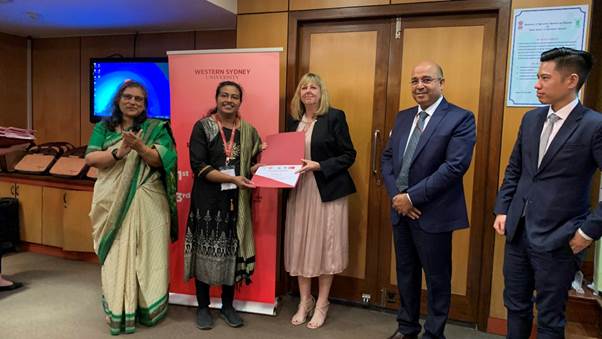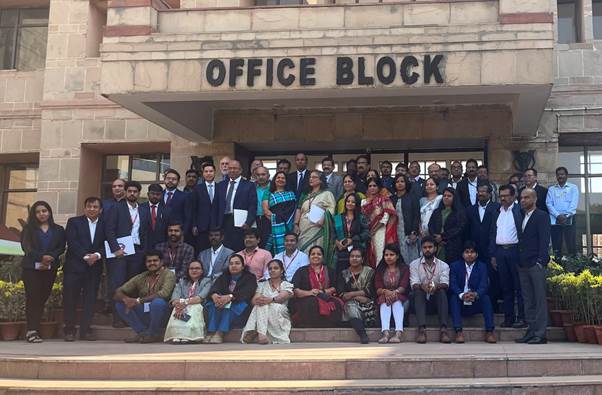Ministry of Jal Shakti
Australia and India partnering to address India’s water challenges
Posted On:
23 NOV 2022 5:12PM by PIB Delhi
Sustainable management of water is a key challenge for both Australia and India. Collaboration in water research, training, and education between our two countries is growing rapidly through several activities supported by the Ministry of Jal Shakti, the Australian Water Partnership, Western Sydney University, and the Indian Institute of Technology, Guwahati.
In this pursuit, the National Hydrology Project, Department of Water Resources, RD & GR, Ministry of Jal Shakti has initiated an innovative Young Water Professional Program in collaboration with Western Sydney University and Indian Institute of Technology, Guwahati, lead of the Australia India Water Centre. The objective of this program are to build the capacity of Young Water Professionals (YWPs) and to provide them with the required knowledge, skills, attitude, and aptitude to offer their best in the country's water sector by accepting leadership roles and responsibilities.
The Young Water Professional Program focuses on gender equality and diversity. The first phase of this Programme has selected 20 young officers (10 men and 10 women) from the National Hydrology Project's central and state implementing agencies. While conducting this program, the Australia India Water Centre brought together eight universities and one State Government Department from Australia and 16 IITs and key universities of India. The concluding event of this 11-month YWP program was organised on 23rd Nov. 2022 in which Ms. Debashree Mukherjee, Special Secretary, DOWR, RD & GR, Ministry of Jal Shakti presided as Chief Guest.
‘India and Australia are natural partners and this collaboration to train young water professionals is an important step in the right direction’, said Ms. Debashree Mukherjee. “I am particularly inspired by the equal participation of women. She stressed the need to orienting capacity building initiatives to meet the challenges likely to be posed by climate change and emphasized that the departments, institutions and academia need to break the silos in which they are working and holistic approach be adopted while dealing with water. She expressed satisfaction that the Yong water Professional Programme has been designed accordingly.
On this occasion, Western Sydney University, with the Ministry of Jal Shakti and the Australian Water Partnership also launched an app for farmers and ordinary citizens, ‘My Well’. It is a citizen science tool for participatory monitoring and visualisation of groundwater, surface water, rainfall, water quality, check dam water levels, and other parameters. This app will be used by villagers trained to manage their groundwater resources. Ms. Debashree Mukherjee, highlighted the importance of validated crowd sourced data to ensure community involvement in water resources management and emphasized the need to integrate the validated crowd-sourced data in the central database being managed by NWIC.
“The YWP program is unique as 70 percent of the program focuses on project-based learning with real-world situations and clients”, said Professor Deborah Sweeny, Dy. Vice-Chancellor of Western Sydney University. “It not only provides technical capacity building, but it also develops the critical thinking, problem-solving, leadership, and project management skills needed for management of water resources and water management reforms in India’, she said. Emphasizing the need for Collaboration between Australia and India,’ Professor Sweeny said. ‘Collaboration is the key for Australia and India, and partnerships drive our SDG impact, including through this important network which brings together key players to tackle the significant water challenges of our two countries.
Mr. Anand Mohan, Joint Secretary, DOWR, RD & GR hoped that the trainee officers who have undergone this course would have grasped trans-disciplinary aspects of water management, as opposed to focusing solely on engineering components, and would be in a position to work on real-world problems. He further stressed that it is crucial that whatever ideas or practices are considered for implementation are suitable to the Indian context, as this is the only way to ensure the success of such initiatives. Mr Anand Mohan informed that DoWR, RD & GR intend to organise phase II of YWP in the next year under NHP in collaboration with Australia India Water Centre.
Professor T.G. Sitharam, Director, the Indian Institute of Technology, Guwahati stressed the need for additional storages in the country to tap the monsoon flows. ‘’Considering the importance of water in Indian Scenario, the youth of the country is required to be prepared to face challenges in managing water resources. According, IIT Guwahati in collaboration with Western Sydney University is rolling out an online Joint Master’s program in Sustainable Water Futures, “This degree is based on short courses - micro-credentials - and provides a great opportunity to build the capacity of water professionals through the joint delivery by Australian and Indian partners of the Australia-India Water Centre,” said Professor Sitharam.


Saurabh Singh
(Release ID: 1878279)
Visitor Counter : 2059